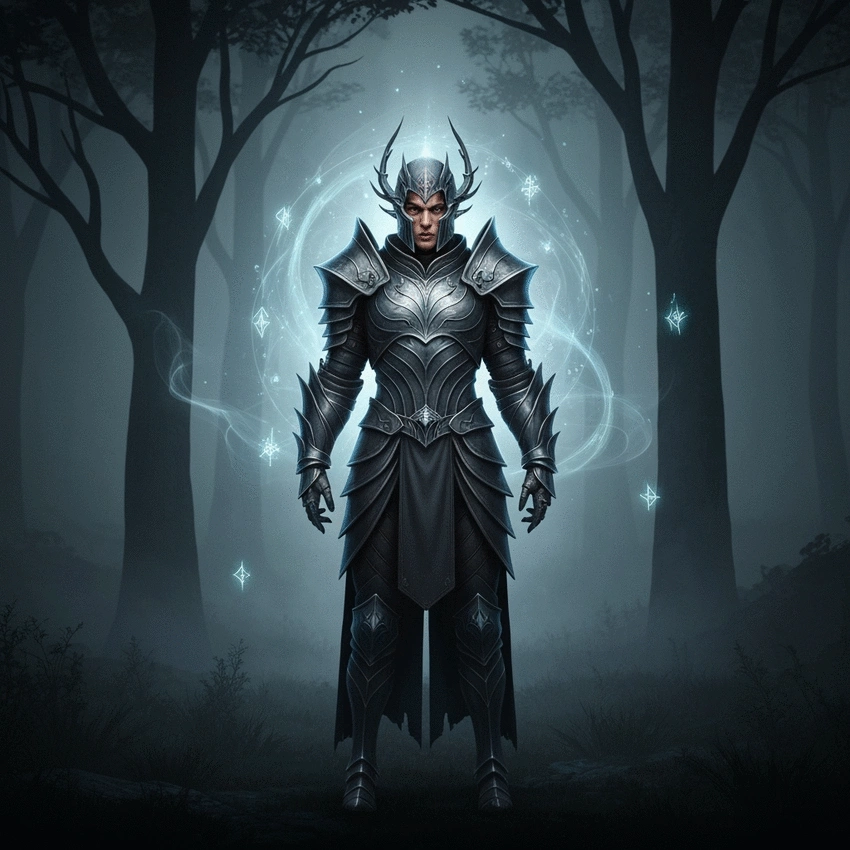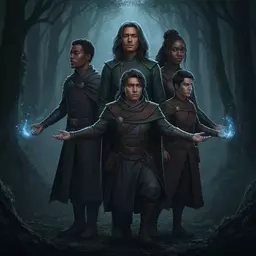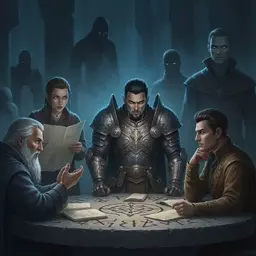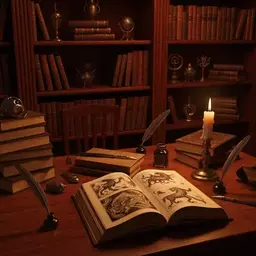Crafting Character Arcs in Dark Fantasy
By Isolde Thorne / Oct 26
In the dim light of a flickering candle, the shadows of our choices dance upon the walls, whispering tales of power and corruption. Have you ever paused to consider the weight of a single decision in a world where every choice can tip the scales of fate? This is the heart of dark fantasy—a realm where the line between hero and villain blurs and the allure of darkness beckons with a seductive promise of strength and consequence.
Delving into the intricate world of dark fantasy, we identify core themes and narrative approaches that shape compelling characters and plots. The visual below highlights the fundamental pillars of this genre's unique moral landscape.
In the realm of storytelling, dark fantasy serves as a compelling canvas where the complexities of morality take center stage. This genre invites readers into worlds where shadows loom large, and choices are rarely black and white. At Shadows of Imagination, we dive deep into these narratives, exploring how moral dilemmas shape both characters and plots. But what exactly defines dark fantasy, and what themes do we encounter along the way?
Dark fantasy is characterized by its integration of traditional fantasy elements with a distinctly darker tone. It often grapples with themes of power, corruption, and the human condition, challenging readers to confront their own values. Many tales in this genre feature protagonists who tread the fine line between heroism and villainy, illustrating the often ambiguous nature of good and evil. So, let’s unravel the core themes that make dark fantasy resonate.
When we think of dark fantasy, several key themes emerge that enrich the narrative tapestry:
As we explore these themes, we begin to see how they frame the moral choices that our characters face. This creates a rich soil for character development, leading us to our next topic: the role of moral complexity.
Moral complexity is the heartbeat of dark fantasy, as it provides a fertile ground for character growth. Characters are often placed in situations where their values are tested, revealing their true natures and motivations. At Shadows of Imagination, we believe that understanding these moral intricacies helps writers create more authentic and relatable characters. To learn more about developing strong character arcs, you might find this resource on how to develop strong fantasy characters useful.
Characters in dark fantasy may grapple with internal conflicts, questioning their decisions and the consequences that follow. By allowing flaws and contradictions to coexist, we enrich their narratives, making them more compelling. This complexity engages readers and invites them to reflect on their own moral beliefs.
One of the most intriguing aspects of dark fantasy is its embrace of grey morality. Rather than presenting clear heroes and villains, these stories often explore the nuances that lie between. Here’s how grey morality manifests in dark fantasy:
By delving into grey morality, writers can create characters that resonate with readers on a deeper level. It challenges us to consider the complexities of human nature and the choices we make when faced with difficult circumstances. As we continue this exploration, we can better appreciate how these elements shape our beloved dark fantasy narratives.
As we explore the depths of dark fantasy, we want to know: Which aspect of morality intrigues you the most in character development?
Dark fantasy is a subgenre that blends traditional fantasy elements with darker themes such as power, corruption, ethical dilemmas, and a focus on grey morality, often featuring flawed protagonists and complex antagonists.
Moral complexity is crucial for character growth in dark fantasy. It places characters in situations where their values are tested, revealing their true natures and motivations, making them more authentic and relatable to readers.
Grey morality refers to the absence of clear-cut heroes and villains. Instead, characters often have ambiguous motivations, protagonists make questionable choices, and antagonists may possess redeeming qualities, blurring the lines between good and evil.
Embracing character flaws makes characters more authentic and relatable. Perfect characters can feel unrealistic, whereas flawed characters facing internal conflicts and ethical dilemmas resonate more deeply with readers, allowing for richer emotional connections.
Common thematic elements include redemption (characters seeking to atone for past mistakes), power and corruption (how the pursuit of power shapes motivations), and loss (how characters confront and grow from significant losses).
As we venture through the shadowy realms of dark fantasy, it's crucial to reflect on the importance of morality in crafting compelling characters. These narratives often challenge our perceptions of good and evil, inviting us to explore the grey areas that lie between. By understanding the moral complexities that define our characters, we not only enhance their depth but also engage readers on a more profound level.
Ultimately, dark fantasy is less about the clear-cut division of heroes and villains and more about the shades of morality that influence character decisions. This complexity is what captivates readers, prompting them to question their own beliefs and the ethical implications of their choices.
The integration of moral dilemmas into character arcs is what elevates a story from mundane to memorable. When characters grapple with their choices, they become relatable to readers, allowing for a deeper emotional connection. This reflection on morality not only enriches the narrative but also serves to mirror the complicated nature of our own lives.
By highlighting these elements, we create a tapestry of intertwined fates that invite readers to ponder their own moral choices. As writers, our challenge lies in depicting these complexities authentically and thoughtfully.
To truly bring characters to life, we must encourage innovation in their development. This means stepping away from traditional archetypes and delving into the unique aspects that make each character distinct. By challenging ourselves to think outside the box, we can create characters that not only entertain but also provoke thought.
As we weave these innovative elements into our storytelling, we invite readers to connect with our characters in meaningful ways, sparking dialogue and reflection long after they've turned the page.
The thematic elements present in character arcs are crucial for maintaining consistency and engagement throughout the narrative. Understanding how these themes manifest in your characters can guide the story's progression and enhance its emotional impact.
By recognizing and integrating these themes, we can craft rich, immersive tales that resonate with readers and inspire them to reflect on their own lives. Remember, every character's journey is a mirror reflecting the complexities of human nature.
As we wrap up this exploration of character creation in dark fantasy, I invite you to take the next step in your writing journey. Each insight here is a stepping stone towards crafting your own morally complex characters, and I hope you feel empowered to experiment and innovate.
To deepen your understanding and enhance your writing skills, consider exploring the following resources:
These resources can provide valuable insights and foster connections within the writing community, enriching your journey as an aspiring author.
At Shadows of Imagination, we believe in the power of collaboration and community. Your insights and feedback are invaluable to us! I encourage you to share your thoughts on these concepts and how you plan to incorporate them into your writing. What challenges do you face in crafting morally complex characters?
Join our discussions, share your stories, and let’s cultivate a vibrant community where creativity flourishes. Together, we can explore the depths of dark fantasy and inspire one another to uncover the shadows of our imagination!
Here is a quick recap of the important points discussed in the article:

 Crafting Character Arcs in Dark Fantasy
In the dim light of a flickering candle, the shadows of our choices dance upon the walls, whispering
Crafting Character Arcs in Dark Fantasy
In the dim light of a flickering candle, the shadows of our choices dance upon the walls, whispering
 Crafting Morally Complex Dark Fantasies
In the dim light of a flickering candle, the shadows of our choices dance upon the walls, whispering
Crafting Morally Complex Dark Fantasies
In the dim light of a flickering candle, the shadows of our choices dance upon the walls, whispering
 Exploring Dark Fantasy Narratives
In the dim light of a flickering candle, the shadows of our choices dance upon the walls, whispering
Exploring Dark Fantasy Narratives
In the dim light of a flickering candle, the shadows of our choices dance upon the walls, whispering